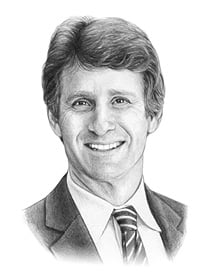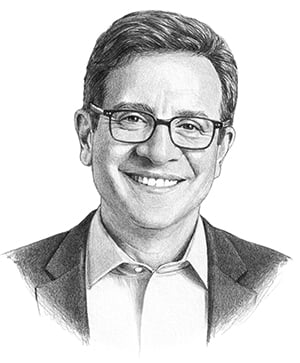Trump’s Trade Policy Tests His Own Team

Analysis
Trump’s Trade Policy Tests His Own Team
Ten thinkers on the start of the U.S. president’s second term.
Klawe Rzeczy illustration for Foreign Policy/Getty Images
This article is part of a collection on the second-term president’s approach to the world. Read the full package here.
The first 100 days of U.S. President Donald Trump’s second term have been a test of whether the radicals and neophytes he placed in senior economic posts could accomplish what the so-called adults of his first term could not: remaking the rules of the global economy to serve the president’s America First agenda.
So far, the results have been spectacularly bad. Trump’s trade policy has lurched from empty threats to sweeping tariffs to humiliating retreats, roiling markets and destroying remaining confidence in U.S. economic leadership. Unless the administration can bring some discipline to its approach, Trump will accomplish none of his goals and leave the United States poorer and weaker.
The first 100 days of U.S. President Donald Trump’s second term have been a test of whether the radicals and neophytes he placed in senior economic posts could accomplish what the so-called adults of his first term could not: remaking the rules of the global economy to serve the president’s America First agenda.
So far, the results have been spectacularly bad. Trump’s trade policy has lurched from empty threats to sweeping tariffs to humiliating retreats, roiling markets and destroying remaining confidence in U.S. economic leadership. Unless the administration can bring some discipline to its approach, Trump will accomplish none of his goals and leave the United States poorer and weaker.
Business leaders and U.S. trading partners had hoped that Trump’s second term would look like his first—certainly more protectionist, but with a coherent approach. But Robert Lighthizer, the veteran who served as U.S. trade representative from 2017 to 2021, was left off the team, reportedly because Trump thought he was “too scared to go big.”
Trump has gone big, but in chaotic and unpredictable ways. He threatened 100 percent tariffs on BRICS member countries if they reduced transactions involving U.S. dollars, imposed and partially lifted tariffs on Canada and Mexico over illegal immigration and fentanyl smuggling, expanded steel and aluminum tariffs, and added 25 percent to the cost of most auto imports.
The coup de grâce was his April 2 announcement of so-called reciprocal tariffs on U.S. trading partners, reaching 50 percent for some countries. The administration used a laughably crude formula that sent stock and bond markets into a tailspin, forcing Trump into retreat.
No one on Trump’s team has been able to explain the president’s actions, much less constrain them. All are novices in government, except for U.S. Trade Representative Jamieson Greer, who worked with Lighthizer, as well as White House advisor Peter Navarro, a radical protectionist who never met a tariff he didn’t like.
Most of the explaining has been left to U.S. Commerce Secretary Howard Lutnick, who predicted that the new tariffs would create jobs for millions of Americans—even as some manufacturers blame the tariffs for layoffs. Treasury Secretary Scott Bessent has looked lost, insisting the tariff announcement was all a negotiating strategy even as Navarro, Lutnick, and others said the opposite. Trump has nonetheless given Bessent a leading role in trying to negotiate new trade deals.
The most serious damage has been to the U.S.-China relationship, which Lighthizer nurtured during Trump’s first term even as he imposed tariffs. This time around, China’s temerity in striking back with retaliatory tariffs has left the two countries in an economic death spiral, with each imposing tariffs high enough to block most trade. No one on the Trump team looks capable of sorting that mess out.
Edward Alden is a columnist at Foreign Policy, the Ross distinguished visiting professor at Western Washington University, a senior fellow at the Council on Foreign Relations, and the author of When the World Closed Its Doors: The Covid-19 Tragedy and the Future of Borders and Failure to Adjust: How Americans Got Left Behind in the Global Economy. X: @edwardalden
More from Foreign Policy
-

An illustration shows a line of large shopping carts facing down a small Donald Trump figure holding two shopping bags. The stars of China’s flag are in the upper left corner. Why Beijing Thinks It Can Beat Trump
China’s elites have a new confidence in their own system.
-

U.S. Army Chief of Staff Randy George speaks to U.S. soldiers at the Hohenfels Training Area in southern Germany on Feb. 6. A Drawdown of U.S. Forces in Europe Is All but Certain
Here’s how the Pentagon can rebalance its approach to the continent without sacrificing U.S. interests.
-

University of California, Los Angeles students, researchers, and demonstrators rally during a “Kill the Cuts” protest against the Trump administration’s funding cuts on research, health, and higher education in Los Angeles on April 8. Why Authoritarians Attack Universities First
A Yale professor and expert on fascism talks about why he’s leaving the United States under Trump.
-

Dwight D. Eisenhower looks over a piece of paper while sitting on a couch as Robert Cutler looks over his shoulder. How Generations of Experts Built U.S. Power
And now Trump is throwing it all away.








Join the Conversation
Commenting on this and other recent articles is just one benefit of a Foreign Policy subscription.
Already a subscriber?
.
Subscribe
Subscribe
View Comments
Join the Conversation
Join the conversation on this and other recent Foreign Policy articles when you subscribe now.
Subscribe
Subscribe
Not your account?
View Comments
Join the Conversation
Please follow our comment guidelines, stay on topic, and be civil, courteous, and respectful of others’ beliefs.
Change your username |
Log out
Change your username:
CANCEL
Confirm your username to get started.
The default username below has been generated using the first name and last initial on your FP subscriber account. Usernames may be updated at any time and must not contain inappropriate or offensive language.